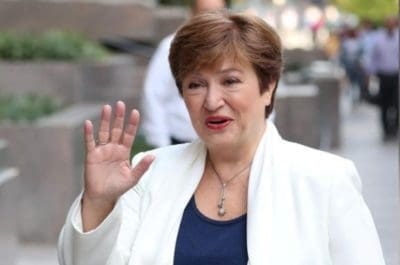The International Monetary Fund (IMF) has flagged a “more pronounced” slowdown in India as it called for a coordinated fiscal response to arrest the “synchronised slowdown in global growth”.
In her first speech as managing director of IMF, Kristalina Georgieva said 90% of the world is likely to have slower growth in 2019, signalling out India along with Brazil.
“In some of the largest emerging market economies, such as India and Brazil, the slowdown is even more pronounced this year,” she said in her inaugural address in Washington DC on Tuesday.
“In China, growth is gradually coming down from the rapid pace it saw for many years.”
India’s economic growth slumped to a six-year low of 5% in the April-June quarter and, according to the Reserve Bank of India (RBI), is likely to be near this trough at 5.3% in the July-September quarter.
The central bank had last week cut the country’s growth forecast for FY20 to 6.1% from 6.8% estimated earlier. The IMF, which had forecast 7% growth for India in its July update of the flagship World Economic Outlook, is likely to lower it sharply in its fresh assessment that will be out next week.
“The global economy is now in a synchronized slowdown,” Georgieva said in her speech, adding that the deceleration will cause global growth to slide to its lowest since the start of the decade.
She blamed the slowdown on a range of issues, but clubbing them under one common theme—fractures. The trade disputes are taking a toll and global trade growth has come to a near standstill.
“In part because of the trade tensions, worldwide manufacturing activity and investment have weakened substantially,” the IMF managing director said, warning “fractures are spreading” and serious risk services and consumption could soon be affected. Brexit and geopolitical tensions are other risks.
“Even if growth picks up in 2020, the current rifts could lead to changes that last a generation—broken supply chains, siloed trade sectors, a ‘digital Berlin Wall’ that forces countries to choose between technology systems,” she said in her speech.
The escalating trade conflict between the US and China, she said, could cost the world dear—a loss of around $700 billion by 2020, or about 0.8% of world GDP.
“Our goal should be to fix these fractures. Our world is intertwined. So, our responses must be coordinated,” she said calling for coordinated efforts to fix the fractures.
Countries need to address legitimate concerns related to their trade practices, she said, pointing to subsidies, intellectual property rights and technology transfers, and called for measures to unlock the full potential of services and e-commerce. Countries that have fiscal room should use those, she suggested, and keep interest rates low.

